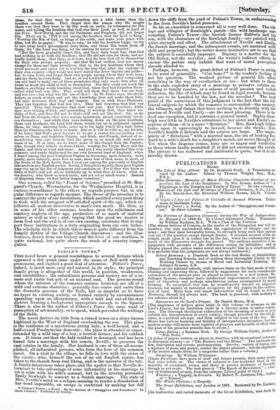FABIAN'S TOWER"
Tins novel bears a general resemblance to several fictions which appeared a few years since under the name of Bell with various prenomens, and excited a good deal of attention. Fabian's Tower, indeed, is much more easy and natural in its style ; the principal family group is altogether of this world, in position, weaknesses, and ammbilities the subordinate persons and scenery are of a re- mote and rustic but not of an. unusual cast. The persona round whom the interest of the romance centres, however, are all of a wild and extreme character; generally less coarse and outre than the dramatis kersown of the Bella, but so singular as to have no types in. existing society, or formed entirely by circumstances operating upon an. idiosyneracy, with a wild and out-of-the-way district forming a background appropriate enough to the figures. There is also in. the author of Fabian's Tower the same want of perception of art-morality, so to speak, which pervaded the writings of the Bells.
The novel derives its title from a ruined tower on a stony barren highland in the West of England overlooking the sea. This place is the residence of a mysterious young lady, a wolf-hound, and a half-crazed Presbyterian domestic ; the place is attended or super- intended by a wild imp of a boy, a boorish farmer, and his cubbish son. It turns oat that the lady resident is deranged, and has been forced into a marriage with her cousin, Neville, to preserve the vast estates in the family. Her husband is one of those all-accom- plished, all-influential persons, who form the hero of the common noveL On a visit to the village, he falls in love with the sister of the curate ; who, himself the son of an old English squire, has taken to the church from real liking, and is the narrator of the tale. A family intercourse takes place, and the upshot is that Neville de- termines to take advantage of some informality in his marriage to set it aside with his wife's consent, but in the interim persuades F_anily Rayleigh to consent to a Scotch marriage. The state of Mrs. Neville's mind on a relapse seeming to render a dissolution of her bond impossible, an escape is contrived by making her fall th_ • Fabian's Tower ; .a NoveL By the Author of .6 smugglers and Foresters," In ree volumes. Published by Newby.
down the cliffs from the yard of Fabian's Tower, in endeavouring to flee from Neville's hated presence.
So far as execution is concerned all is very well done. The vil- lage and villagers of Rawleigh's parish—the wild landscape sur- rounding Fabian's Tower—the boorish farmer Baldwin and his son, with the characters of the Rayleigh family—are painted with quiet strength and effect. The attachment of Neville and Emily, the Scotch marriage, and the subsequent events, are narrated with skill and propriety ; but the writer wants instinctive art to see that the subject is essentially improper. Bigamy is a matter for the Old Bailey, not the novelist ; and the writer's indirect efforts to excuse the parties only exhibit that want of moral perception already alluded to. Perhaps, however, the great defect of Fabian's Tower is owing to its want of generality. "Cal bono ? " is the reader's feeling if not his question. The weakest picture of general life offers something in the way of recollection or use ; but what is there in the stale exploded story of a marriage to preserve estates ac- cording to family resolve, or a scheme of wild passion and veiled seduction, the like of which may be found in legal records, because they are to be handled by the law, not the novelist ? The best proof of the correctness of this judgment is the fact that the col- lateral subjects by which. the romance is surrounded—the scenery, the villagers, and things that have nothing to do directly with the passion of Neville and Emily—are the most pleasing. There is in- deed one exception, but it contains a general moral. Sophia Raw. leigh sees little in Neville's attentions to her sister and Emily's re- ception of them—it is a. mere "flirtation." Mrs. Rayleigh rather looks upon it approvingly to herself, because she thinks Mrs Neville's health is delicate and the estates are large. The impro- priety of " flirtations " with a married man, the sin of looking for- ward to a wife's death for a daughter's match, are never thought of. Yet when the disgraoe comes none are so angry and vindictive as those whose laxity permitted if it did not encourage the result. The picture is too scattered and incidental to quote, but it is ad- mirably drawn.


























 Previous page
Previous page